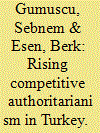| Srl | Item |
| 1 |
ID:
092501


|
|
|
|
|
| Publication |
2009.
|
| Summary/Abstract |
Historically, the closure of a party is a common phenomenon in Turkish politics. While the recent case against the governing Justice and Development Party (Adalet ve Kalkinma Partisi, AKP) was reminiscent of this trend, the decision of the Constitutional Court demonstrated that there are changes in the dynamics of the Turkish political structure. Although the literature cites the so-called '28 February Process', the impact of EU accession, and the learning effects of democratization as explanations for the distinction of the AKP from its predecessors, this article argues that the AKP is different due to its extended business network and newly defined conservative base. The decision of the court in the recent closure case against the AKP reflects this structural political change within the foundation of Islamic parties in Turkey. While the court acknowledged the political legitimacy of the party by taking a decision against its closure, it has revealed the general discontent regarding AKP's non-adjusted conservative/pro-Islamic policies by cutting down its financial means.
|
|
|
|
|
|
|
|
|
|
|
|
|
|
|
|
| 2 |
ID:
148258


|
|
|
|
|
| Summary/Abstract |
Since the Justice and Development Party (AKP) came to power in 2002 Turkey has undergone double regime transitions. First, tutelary democracy ended; second, a competitive authoritarian regime has risen in its stead. We substantiate this assertion with specific and detailed evidence from 2015 election cycles, as well as from broader trends in Turkish politics. This evidence indeed confirms that elections are no longer fair; civil liberties are being systematically violated; and the playing field is highly skewed in favour of the ruling AKP. The June 2015 election results and their aftermath further confirm that Turkey has evolved into a competitive authoritarian regime.
|
|
|
|
|
|
|
|
|
|
|
|
|
|
|
|